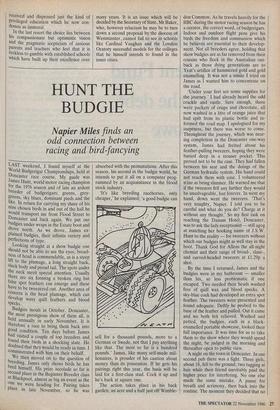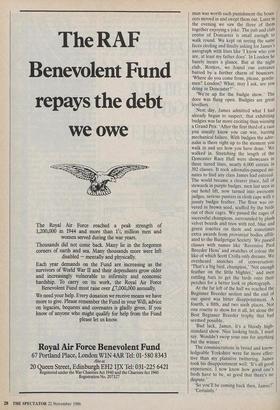HUNT THE BUDGIE
Napier Miles finds an
odd connection between racing and bird-fancying
LAST weekend, I found myself at the World Budgerigar Championships, held at Doncaster race course. My guide was James Hunt, world motor racing champion for the 1976 season and of late an ardent breeder of budgerigars: greens, grey- greens, sky blues, dominant pieds and the like. In return for carrying my share of his nine chosen birds in and out of the hall he would transport me from Flood Street to Doncaster and back again. We put our budgies under wraps in the Estate boot and drove north. As we drove, James ex- plained budgies, their infinite variety and perfections of type. Looking straight at a show budgie one should not be able to see the eyes; broad- ness of head is commendable, as is a steep lift to the plumage, a long straight back, sleek body and proud tail. The spots under the neck merit special attention. Usually there are six forming a broken ring but false spot feathers can emerge and these have to be tweezered out. Another area of concern is the head plumage, which can develop waxy quill feathers and blood specks.
Budgies moult in October. Doncaster, the most prestigious show of them all, is held annually in early November. It is therefore a race to bring them back into good condition. Ten days before James had visited a couple of top breeders and found their birds in a shocking state. He doubted that they would be ready in time. I commiserated with him on their behalf. We then moved on to the question of breeding. James only shows birds he has bred himself. His prize accolade so far is second place in the Beginner Breeder class at Blackpool, almost as big an event as the one we were heading for. Pairing takes place in late November, so he was absorbed with the permutations. After this season, his second in the budgie world, he intends to put it all on a computer prog- rammed by an acquaintance in the blood stock industry.
`It's like breeding racehorses, only cheaper,' he explained; 'a good budgie can sell for a thousand pounds, more to a German or Swede, not that I pay anything like that. The most so far is a hundred pounds.' James, like many self-made mil- lionaires, is prouder of his caution about money than its possession. If he gets his pairings right this year, the basis will be laid for a first-class stud. Cock it up and he's back at square one.
The action takes place in his back garden, an acre and a half just off Wimble- don Common. As he travels heavily for the BBC during the motor racing season he has a curator, the correct word, of budgerigars. Indoor and outdoor flight pens give his birds the freedom and communion which he believes are essential to their develop- ment. Not all breeders agree, holding that show budgies are as far removed from their cousins who flock in the Australian out- back as those dying generations are to Yeat's artifice of hammered gold and gold enamelling. It was not a simile I tried on James as I wanted him to concentrate on the road.
`Under your feet are some supplies for the journey.' I had already heard the odd crackle and rustle. Sure enough, there were packets of crisps and chocolate, all now washed in a litre of orange juice that had spilt from its plastic bottle and in- formed the road map. I apologised for my ineptness, but there was worse to come. Throughout the journey, which was near- ing completion in the Doncaster one-way system, James had fretted about his feather-pulling tweezers, hoping they were buried deep in a trouser pocket. This proved not to be the case. They had fallen between his seat and the doings of the German hydraulic system. His hand could not reach them with ease. I volunteered mine as being slimmer. He warned me that if the tweezers fell any further they would be unsalvageable, lost forever. In went my hand, down went the tweezers. 'That's very naughty, Napier. I told you to be careful and what do you do? Charge at it without any thought.' So my first task on reaching the Danum Hotel, Doncaster, was to ask the lady receptionist — still agog at matching her booking name of J.S.W. Hunt to the reality — for tweezers without which our budgies might as well stay in the boot. Thank God for Allens the all-night chemist and their range of broad-, slant-, and curved-headed tweezers at £1.29p a shot.
By the time I returned, James and the budgies were in my bathroom — smaller than his, so less problematic if one escaped. Two needed their heads washed free of quill wax and blood specks. A sky-blue cock had developed an extra spot feather. The tweezers were presented and found adequate. Deftly he probed to the base of the feather and pulled. Out it came and we both felt relieved. Washed and petted, the budgies, each in a black- enamelled portable showcase, looked their full importance. It was time for us to take them to the show where they would spend the night, be judged in the morning and thereafter open to public view.
A night on the town in Doncaster. In our second pub there was a fight. Three girls, about 18, fell to the ground, two tugging at hair while their friend inevitably paid the higher price for interfering. No one else made the same mistake. A pause for breath and acrimony, then back into the routine. The moment they decided that no man was worth such punishment the boun- cers moved in and swept them out. Later in the evening we saw the three of them together enjoying a joke. The pub and club centre of Doncaster is small enough to walk round. We kept on seeing the same faces circling and finally asking for James's autograph with lines like 'I know who you are, at least my father does'. In London he barely incurs a glance. But at the night club, Rotters, we found our entrance barred by a further charm of bouncers. `Where do you come from, please, gentle- men? London? What, may I ask, are you doing in Doncaster?'
`We're up for the budgie show.' The door was flung open. Budgies are great levellers.
Next day, James admitted what I had already begun to suspect, that exhibiting budgies was far more exciting than winning a Grand Prix. 'After the first third of a race you usually know you can win, barring mechanical failure. With budgies the adre- nalin is there right up to the moment you walk in and see how you have done.' We walked in. Stretching the length of the Doncaster Race Hall were showcases in three tiered lines, nearly 6,000 entries in 392 classes. It took adrenalin-pumped mi- nutes to find any class James had entered. The world became a clearer place, full of stewards in purple badges, men last seen in our hotel lift, now turned into awesome judges, serious punters in cloth caps with a jaunty budgie feather. The floor was co- vered in brown seed, scuffed by the birds out of their cages. We passed the cages of successful champions, surrounded by plush velvet boards and trios with red, blue and green rosettes on them and sometimes extra awards from provincial bodies affili- ated to the Budgerigar Society. We passed classes with names like 'Recessive Pied Breeder Hens' and swatches of colour the like of which Scott Crolla only dreams. We overheard snatches of conversation: `That's a big bird, champion,' Not enough feather on the little blighter,' and men rattling bars to get the birds onto their perches for a better look or photograph.
At the far left of the hall we reached the Beginner Breeder section and the end of our quest was bitter disappointment. A fourth, a fifth, and two sixth places. Not one rosette to show for it all, let alone the Best Beginner Breeder trophy that had seemed possible.
`Bad luck, James, it's a bloody high- standard show. Nice looking birds, I must say. Wouldn't swop your one for anything but the winner.'
The commiserations in broad and know- ledgeable Yorkshire were far more effec- tive than my plaintive twittering. James took his disappointment well: 'It's all good experience. I now know how good one's birds have to be, so good that there's no dispute.'
`So you'll be coming back then, James?' `Certainly.'



























































 Previous page
Previous page